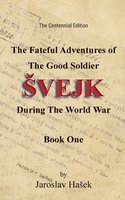One fact is undeniable: the "švejking" method has been so popular and successful that political, military, and intellectual leaders at times feel the need to openly decry it and those who are suspected of employing it. The novel that introduced this survival method to the world was banned from the Czechoslovak army in 1925, the Polish translation was confiscated in 1928, the Bulgarian translation was suppressed in 1935, and the German translation burned on Nazi bonfires in 1933. Gustáv Husák, the General Secretary of the Czechoslovak Communist Party who replaced the Prague Spring reformer Alexander Dubček in that post after the 1968 Warsaw Pact invasion and occupation of Czechoslovakia, and assumed the Presidency as well, exhorted the population in a speech during the 1970's period of the so-called normalization to "STOP ŠVEJKING!!!"
The original Czech text online
Osudy dobrého vojáka Švejka za světové války
The first weekly installment of the book was published on March 1st, 1921:

The cover of the original edition
(Book Two, installment 7-8, price 4 Czech crowns)
Published by J. Hasek. Distributed by A. Synek Publishers, Prague 6.
List of translations of the original
English
The first, abridged and bowdlerized translation by Paul Selver (1888 Mar 22 - 1970 Apr 9),
The Good Soldier Schweik
London, Heinemann, 1930
The second, first unabridged translation by Cecil Parrott,
The Good Soldier Švejk and his fortunes in the World War
New York, Thomas Y. Crowell Company, 1973
The third and unabridged translation
The Fateful Adventures of the Good Soldier Švejk During the World War
Book One
by Zenny K. Sadlon and Emmett M. Joyce
1stBooks Library, 2000
Book Two and Book(s) Three&Four
by Zenny K. Sadlon
AuthorHouse, 2009
The first reaction to the manuscript of the first volume, i.e. Book One,
was provided by a Chicago VA hospital microbiologist Ruth Cooper,
who would sit around a table at lunch with her coworkers while reading,
and pass the pages along. And here is her report from 1997:
The Centennial Edition
of The Fateful Adventures of the Good Soldier Švejk During the World War
Book One
by Zenny K. Sadlon
Keenan, Sadlon & Lord, Inc., August 6, 2024
BookLife Editor's Pick Review
Readers familiar with Hašek’s satirical Czech novel
of war and survival only from earlier English translations
will likely be jolted by Sadlon’s version...
Hašek’s masterpiece is revealed, in Sadlon’s handling,
as a book of greater bite, heft, and complexity. ...
The result is challenging and provocative, a century on.
Takeaway:
Illuminating translation
of the human complexity of a Czech classic.
 The Fateful Adventures of the Good Soldier Švejk D ....
Hašek, Jaroslav and Sadloň, Zdeněk "Zenny" K.
|
Booksellers or fund raisers,
for wholesale orders of
The Centennial Edition of Book One,
contact the publisher
directly by email!
Challenges of translating Švejk into English: A report on the experimental project of its “Chicago version”
"A decision to translate the 207,009 words of Hasek’s unfinished novel in my judgment cannot be – and in my case indeed was not – a result of a rational consideration."
The Loneliness of the Long Distance Translator
"I feel compelled and have enough time at last to address Michelle Wood’s text that appeared in Jacket 18 ― August 2002. She reviewed 'the new online translation' of Book One, i.e. the text we made available to the reading public for purchase on the Internet in 1997 and sent to her to review a couple of years before she published the result."
Woods vs. Sadlon - Super Grok renders a verdict
It's been 23 years since Michelle Woods' critique was published and 15 years since Zenny Sadlon's response. No academician has bothered to review the competing claims about the quality of Book One of the original edition of "the Chicago version" English translation. So we asked the up-and-coming Artificial Intelligence (AI) machine, Super Grok to do the job.
Translations available on-line
An on-line Polish translation
Przygody dobrego wojaka Szwejka podczas wojny światowej
(Adventures of the Good Soldier Švejk During the World War)
An on-line Russian translation
Похождения бравого солдата Швейка
(Adventures of the Brave Soldier Švejk)
An on-line Ukrainian translation
Пригоди бравого вояка Швейк
(Adventures of the Brave Soldier Svejk)
An on-line Hungarian translation:
Svejk - Egy derék katona kalandjai a világháborúban
(Adventures of the Good Soldier Švejk During the World War)
Eloszó (Introduction)
Book One, A Hátországban (In the Rear)
Book Two, A Fronton (At the Front)
Book Three, A Dicsoséges Csihi-puhi (The Famous Thrashing)
Book Four, A Dicsoséges Csihi-puhi Folytatása (The Continuation of the Famous Thrashing)
An on-line Esperanto translation:
La brava soldato Švejk, 1, 273 pages, 2.1 MB
La brava soldato Švejk, 2, 271 pages, 1.1 MB
La brava soldato Švejk, 3, 269 pages, 1.4 MB
La brava soldato Švejk, 4, 103 pages, 537 KB
How the book was born: The two predecessors.
Dobrý voják Švejk a jiné podivné historky
(The Good Soldier Švejk and Other Strange Stories)
The original five Švejk stories first published in 1911 in Karikatury [Caricatures] and Dobrá kopa [Good Fellow]. Here the hero is a mere good-hearted, loyal Czech soldier and the "company numskull".
Karel Stroff's 1911 drawing
Karel Stroff (b. 1881 Kutná Hora, Czech Lands, Austria-Hungary - d. 1929 Prague, Czechoslovakia) was a very well known Czech illustrator of the early 20th century. He studied first under E. K . Liska, and later, between 1899 and 1901 at the Prague Academy under Ženísek. At last he was a student of F. Stuck in Munich, Germany. He produced work for the best Czech and German magazines.
An on-line text of the second predecessor, the same five stories as above, but published as a book instead of magazine story:
Dobrý voják Švejk před válkou
(The Good Soldier Švejk Before the War)
An on-line Russian translation of The Good Soldier Švejk Before the War
Бравый солдат Швейк перед войной
(The Brave Soldier Švejk Before the War)
A Russian audio version of the book
A Spin-off Book Fragment
Arthur Koestler recalls in his memoirs that in the summer of 1935 he "wrote about half of a satirical novel called The Good Soldier Schweik Goes to War Again.... It had been commissioned by Willy Münzenberg [the Comintern's chief propagandist in the West] ... but was vetoed by the Party on the grounds of the book's 'pacifist errors' " (The Invisible Writing: An Autobiography by Arthur Koestler [New York, 1954], p. 283).
A Spin-off Book
On Yer Bike, Schweik!
Eric Davidson
Time Warner Paperbacks, London, December 9, 1993
"Based on the letters a father sends home to his family while serving from Dunkirk to Monte Cassino, these 16 tales represent one man's experience of a war. They concern the legion of botchers and bunglers who were doing their noblest and best not to win the war." - amazon.co.uk
